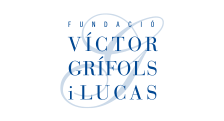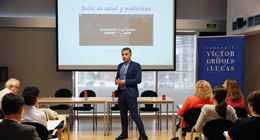The Foundation promotes ethical debate in a world in which our communication processes are being transformed
The transformation we have witnessed in the world of communication over the last two decades – which affects information sources, formats, distribution channels, access devices and participants in the communication process – means we need to review the role of advertising and its impact on health, not only from the perspective of health and medicines (drugs, care services and providers, different treatment options and therapies, institutional health promotion campaigns) but also any campaign that could have an impact on people's health or is related to diet and lifestyle. To address these topics and stimulate dialogue, on 5 June – in partnership with Pompeu Fabra University (UPF) – we held a seminar that brought together experts and professionals from a wide range of backgrounds to consider the impact of advertising on health.
The opening address was given by Gema Revuelta, director of the Centre for the Study of Science, Communication and Society at UPF, in which she provided an overview of the new media landscape and the transformation the sector has undergone. She argued that our consumption of media content is not just passive but is also an active process. These changes mean that further regulation is required in the field of health, and this in turn entails far-reaching ethical considerations.
Jordi Pérez, a member of the Scientific Educational Research Group at UPF, reflected on the influence of advertising on attitudes and behaviours. Pérez looked at how advertising messages are constructed, starting with a persuasive intention, based on a message's credibility and attractiveness and its capacity to connect with the potential audience.
Patrici Calvo, lecturer in bioethics at Universitat Jaume I, Castellón, summarized the current digital transformation. In particular, he warned of the potential dangers – particularly with regard to health issues – for vulnerable groups in this new scenario. The use of techniques based on artificial intelligence offers huge benefits but also poses considerable risks such as undermining privacy or the possibility of algorithm-based decision-making which, in the case of marketing and advertising, can give rise to serious errors and to aggressive and inappropriate campaigns. To address this issue, Calvo argued that we need to strengthen our control systems, promoting mechanisms based on systems to monitor ethical compliance in advertising, the creation of codes of ethics, and the expansion of ethical audits.
Legislation was a key focus of discussion throughout the day. Nuria Amarilla, senior partner at Eupharlaw, summarized the legislation that currently governs advertising activity. She stressed that there is already adequate legislation to regulate advertising activity, but argued that it is essential to keep this under constant review to fill any legal vacuums that may arise as a result of ongoing changes.
The discussion also covered the issues of self-regulation and control. Charo Fernández, assistant directory general of Autocontrol, explained what her organization does. This is a nonprofit body created by the industry in response to society's calls for guarantees to ensure that advertising is accurate and trustworthy. It brings together advertisers, advertising agencies and media organizations, and is designed to ensure compliance with advertising legislation. Fernández argued that "it is precisely the stakeholders in the advertising industry who have the biggest interest in ensuring that the rules are respected." The number of inquiries from companies, agencies and media organizations continues to grow and, during the course of 2018, Autocontrol expects to receive almost 5,000 requests to review campaigns, the majority of which correspond to advertising for healthcare, health products and food.
Carlos Mateos, coordinator of the platform #SaludSinBulos (#HealthWithoutRumours) used some examples to demonstrate how easily fake news can spread. This is particularly dangerous when it affects people's health, as it can give rise to beliefs and behaviours which harm people's health. To address this problem, Mateos explained the various initiatives promoted by his platform, which involve developing materials to encourage people to take a critical approach to information, revealing the sources of fake news, sharing knowledge of credible sources and, more generally, promoting a more sophisticated knowledge culture.
The seminar ended with a session dedicated to analyzing advertising's influence on the construction of people's self-image. Mónika Jiménez of the UPF's Observatorio MediaCorp explained the research activity of this organization in recent years, to empirically demonstrate that advertising offers a distorted image of the body. Jiménez pointed out that advertising aimed at adults is also consumed by minors, who absorb stereotypes that do not reflect reality. According to a study conducted in 2015 analyzing the 150 adverts with the highest viewing figures among children in Spain, 72% of these featured people with near-perfect bodies. This has a major effect, as it generates a distorted body image and the pursuit of impossible aesthetic ideals. Jiménez explained that MediaCorp, in addition to research, also promotes materials to encourage children to read information critically and organizes workshops to help counter-act the false body image often offered by advertising.
The final contribution of the day came from Begoña Román, lecturer in Ethics at the School of Philosophy (UB) and Chair of the Social Services Ethics Committee of Catalonia, who offered some philosophical reflections on the contents of the seminar. She argued that we need an ethical commitment to underpin the stance that advertising should not be a free-for-all. "Health-related advertising does not generate self-confidence, respect and self-esteem, despite the fact that this is precisely what its proponents often claim."


